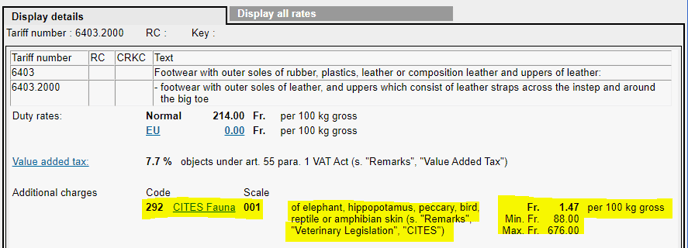How important is CITES for imports into Switzerland in cross-border e-commerce?
Trading with CITES-relevant goods poses many challenges, but it also offers opportunities. By carefully planning and implementing professional support, the importer can successfully overcome these challenges.
Meaning of CITES
The Convention on International Trade in Endangered Species of Wild Fauna and Flora, better known as CITES, constitutes an important protection mechanism for endangered species. It regulates and controls their international trade, so as not to endanger the species’ survival.
Role in cross-border e-commerce
As a result of increasing digitization and globalization of trade, CITES is playing a crucial role. It facilitates secure and regulated trade of exotic goods, including endangered species, across international borders.
Discover the secrets of CITES trade
Ready to dive into the fascinating world of international trade with CITES-listed species? We reveal everything in our detailed blog article – from the role of the forwarder to pro tips for a seamless import process. Take the plunge and get ready to become an expert in this area. Don’t let this adventure pass you by, read our article now!
CITES-compliant for Switzerland: a guide to cross-border e-commerce with exotic animals and plants
The CITES import process
CITES trading licenses
The export and import of CITES-listed species must be licensed accordingly. This requires approval from the responsible authorities of the export and import country.
Import declaration and customs clearance
Import declaration and customs clearance are central aspects of the import process. Every import requires a correctly completed import declaration and the fulfilment of all customs formalities.
Long-term import permit
A long-term import permit allows for goods to be imported for two years without re-applying for customs clearance. This simplifies trading and minimizes the risk of delays.
The role of forwarders and customs agents
Selection and assignment
An experienced customs agent can make the import process significantly easier. With their expertise in customs clearance and the import process they can help to overcome obstacles.
Important information for the forwarder
For seamless customs clearance, the forwarder needs to have all necessary information in front of them. That includes item details, country of origin, manufacturer, etc.
Best practices and pro tips for importing
Document collection and rights updates
Collecting all relevant documents in advance and noting current legal changes can significantly contribute to avoiding problems with imports.
Communication and data automation
Effective communication and automated data alignment can help to minimize errors and speed up the process.
Using the Tares customs tariff
The Tares customs tariff includes important information about customs duties, additional charges and licensing requirements. Using this tool can help to avoid surprises and simplify the process. Let’s take leather shoes as an example. If these were made of CITES-relevant materials (see red box in center), additional costs (min. 88 – max. 676 CHF) could apply.
Challenges and problems with customs clearance
Typical errors and their solutions
Errors during customs clearance may lead to delays and additional costs. These include erroneous or missing documents, for example. Early preparation and adherence to best practices can avoid such errors.
Costs and fees
The costs of customs clearance and import can be significant. Expert advice can help to minimize these costs and make the import process more cost-effective.
